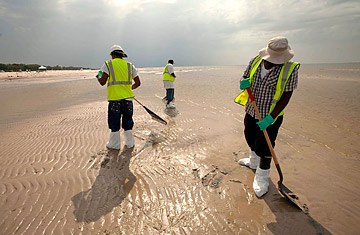
Workers use shovels and rakes to look for tarballs in the surf in mid-August in Longbeach, Miss.
Spend some time on the Gulf Coast, and you'll quickly find out that people are worried. They're worried about the environmental effects of the BP oil spill, what 4.9 million bbl. of crude — and some 2 million gal. of chemical dispersants — might do to the coastline, the marshes and the underwater ecology of the Gulf of Mexico. They're worried about the economic future of their region, whether fishing will ever bounce back, whether the tourists who stayed away from the Gulf Coast this summer will return once the spill has been cleaned up.
But they're also worried about what the oil spill might be doing to them. Cleanup workers are worried about the effects of being around the spill, of breathing in oil fumes and handling tarballs. Diners are worried about whether Gulf seafood is safe to eat. Parents are worried about what the oil might do to sensitive children, whether there could be some long-term impacts that aren't obvious right now.
The government has tried to offer some assurance. The Food and Drug Administration is testing Gulf seafood and so far hasn't found any evidence of lingering toxicity. The Environmental Protection Agency is testing air and water quality; again, so far, so good. President Barack Obama even took his family to the Florida panhandle for a brief vacation this past weekend and was photographed swimming in the Gulf. "Beaches all along the Gulf Coast are clean, they are safe, and they are open for business," Obama told reporters on Aug. 14.
But as a new paper in the Journal of the American Medical Association (JAMA) shows, we still don't have a very good fix on what the health impacts of such a major spill might be. Though we know that oil contains dangerous chemicals and carcinogens and that dispersants can be irritating, the truth is, we're only now beginning to do the studies needed to get a complete idea of the total risks. "Previous studies of the health impacts of other oil spills have been pretty thin," says Dr. Gina Solomon, a senior scientist at the Natural Resources Defense Council and an assistant professor of medicine at the University of California, San Francisco. "There's still a lot we don't know."
What we do know is that exposure to fresh oil, especially in large quantities, can make people immediately sick. Oil contains volatile organic compounds (VOCs) like benzene and toluene. Such VOCs evaporate relatively quickly once the oil hits the surface, but they can cause respiratory distress if people come into contact with them. Benzene is also a known carcinogen, though given how long the oil would have been on the water's surface before it reached the coastline, it likely evaporated along the way. But other substances, including polyaromatic hydrocarbons (PAHs), can linger much longer. "Those are the sort of chemicals we might worry about," says Solomon.
So far there haven't been reports of major health impacts from the BP spill. The JAMA paper reports that in Louisiana during the early months of the spill, some 300 individuals — three-quarters of them oil-spill workers — sought medical care for symptoms like headaches, nausea, chest pain and respiratory distress. As Solomon notes, many of those symptoms are typical of exposure to hydrocarbons, but it's difficult for doctors to distinguish illnesses that might come from oil exposure from health problems that could have appeared for another reason. Cleanup workers in particular were laboring under difficult conditions, working outdoors in the brutally hot Gulf summer. Heat exhaustion and dehydration could explain some of those complaints, but without close studies, it's hard to know for sure.
The problem is that there have been shockingly few studies done on the health impacts of previous oil spills. That includes the 1989 Exxon Valdez spill; though a great deal of research work has been done on the ecological impacts of the spill, comparatively little has gone into the long-term health effects on cleanup workers and residents. "The first thing we did when working on this paper was go back and look at what was done on the Exxon Valdez," Solomon says. "I was shocked at how little there was." Work done on other spills offers some areas of concern: researchers studying the 2002 Prestige spill in Spain found evidence of genetic damage among cleanup workers, though it's not clear how serious that might be.
Beyond cleanup workers, Solomon has concerns about how seafood might be affected by the crude. Vertebrate species are generally able to filter out PAHs without too much trouble, but in invertebrates like oysters and shrimp, those chemicals can accumulate for years. That's bad news for Louisiana, where shrimp and oysters are major parts of the seafood industry (though the FDA and EPA will be keeping close tabs on seafood quality).
As the spill winds down, what's really needed are major studies that can provide firm answers on what health effects the spill is or isn't having. The good news is that the National Institutes of Health is launching major studies on the spill, tracking thousands of cleanup workers. With the right methodology, those studies can help researchers discern which illnesses really can be traced back to the oil. Still, with the oil-spill battle lines shifting from the coasts to the courtroom as Gulf residents fight for compensation, any answer researchers come up with is likely to be controversial.
